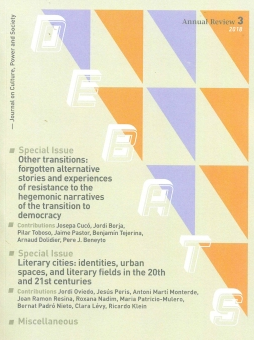Between history, myth, and the present: an asymmetric transaction
Resum
The period known as the Spanish political transition—whose duration is still subject to debate—has been interpreted in many ways, though the dominant and official narrative is the version that portrays it as ‘exemplary’. This paper critically reviews the process that led to the relative stabilisation of a new parliamentary monarchy together with its gradual integration into the European project. We highlight the context, uncertainties, and splitting crossroads that appeared in different periods of the transition. This paper upholds the idea that the transition was an asymmetric compromise that avoided a democratic rupture with Franco’s dictatorship and its legacy. We recognise the liberties and rights that were won, but likewise, we emphasise the costs entailed in this process. In particular, the transition had a high political cost in that it fostered an elitist political culture that, in spite of several waves of protests, was not challenged by a social majority until the emergence of the most recent surge of protest as an result of the 15 May 2011 movement. Since then, the unfolding crisis of the regime—which is related to the crisis also currently affecting the EU in the aftermath of the financial and real estate crisis of 2008—as well as the internal national–territorial division in Spain, has once again put the issue of the Spanish transition, and the possible need for a ‘second transition’ or new constituent processes, under the spotlight of debate.Descàrregues
Descàrregues
Publicades
Com citar
Número
Secció
Llicència
Sense perjudici del que disposa l'article 52 de la Llei 22/1987 d'11 de novembre de Propietat Intel·lectual, BOE del 17 de novembre de 1987, i conforme a aquest, els/les autors o autores cedeix/en a títol gratuït els seus drets d'edició, publicació, distribució i venda sobre l'article, per tal que siga publicat a Debats. Revista sobre cultura, poder i societat.
Debats. Revista de cultura, poder i societat es publica sota el sistema de llicències Creative Commons segons la modalitat “Reconeixement – NoComercial (by-nc): Es permet la generació d’obres derivades sempre que no se’n faça un ús comercial. Tampoc no es pot fer servir l’obra original amb finalitats comercials”.
Així, quan l’autor/a envia la seva col·laboració, accepta explícitament aquesta cessió de drets d’edició i de publicació. Igualment autoritza Debats. Revista de cultura, poder i societat la inclusió del seu treball en un fascicle de la revista perquè es puga distribuir i vendre.











